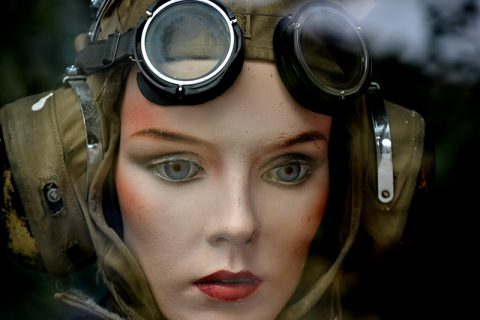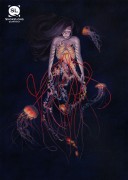The mother in the story is preparing herself to leave her son forever. The earliest memory I have of my mom leaving is at the beauty shop (yes, I got my hair cut next to the little old ladies). Because I would not act right in the chair with my mother present, Ms. Helen, the beautician, made her leave. What’s your earliest memory of Mom leaving?
I don’t have any first memory of my mother leaving me, but I do have a distinct first memory of leaving her. I must have been three or four years old. We were returning from the playground, standing outside our building. While she looked for her keys in her purse, I quickly hid behind a loading dock. I could see her through gaps between the loading dock steps, but she couldn’t see me. I watched her scan up and down the block for me, calling my name—sharply, then in an “OK, this isn’t funny” kind of tone, then panicked. Finally, I burst out from my hiding place, and she was furious. I don’t know what reaction I’d expected, but her anger was surprising and frightening. I fleetingly sensed that the world was very large and dangerous.
The first sentence of your piece propels us forward, gives us backstory, and makes me feel in waves. It creates questions that don’t need answering in the world of the story such as, “Did our narrator go through all of these thoughts once already? Is this the painful replay?” These ten words are heartbreaking, quite wonderful, and might work as their own narrative without anything else. Is this always where the story began or was there a bit of a fight to get here?
The story began not as a story, but as a jotted-down description of children riding one of those live-pony carousels. I had recently gone to a tiny fair in Alachua, Florida, called the Zucchini Festival. I had expected there to be zucchini in many forms—fried, of course, but perhaps there would also be zucchini bread, jams, who knew?—but it turned out fried was the only option. It was disappointing. Anyway, the image of little kids on these four miserable, chunky ponies stayed with me, and I ended up constructing the narrative around it. I hesitated to use that first sentence, actually, because it’s so loaded, and it could easily be a slip-slide into cliché from there.
I have a black-and-white picture of my grandfather in which he’s resting his head atop a birdhouse. It’s taken up close and his body is mostly blocked out. I feel like his essence lives inside that photo. It has everything to do with “remembering” to me. Could you describe a similar picture in your own life?
I love your image! Perhaps this betrays some kind of narcissism, but the picture I think of first is not a photograph, but one I drew as a kid. It was a large depiction of the garden from Francis Hodgson Burnett’s The Secret Garden on butcher paper. I had taped it to the walls of my bedroom closet so that I could sit inside it with a flashlight, or even in the pitch dark, and pretend I was somewhere private, mysterious, and magical.
Remembering those colorful, carefree drawings of flowers and trees and a toolshed, and tangled vines cascading over old stone walls, enables me recall the inner life of my childhood self (which usually feels like a total abstraction) in a way that is sensorial and immediate.
“The day was very hot” breaks up the cadence of that last paragraph in such an odd, wonderful way. Can you speak to how this short sentence came to be right where it is?
I hoped that the sentence would ground the imagery and imaginings that surround it, which otherwise might sort of just hang there or float away. The simple fact carried by those words—“The day was very hot”—offers something tangible and concrete; it roots both the narrator and the reader to a story’s time and place. It also gives a logical context for the narrator’s fantasy that heaven would be a cool place, in contrast to that sweltering day at the fair. And the rhythm felt right, to have a short, simple sentence in the midst of more winding ones.
I have to ask; what’s your favorite carnival food?
Churros—or really any kind of fried dough. No question.



 The core workshop of SmokeLong Fitness is all in writing, so you can take part from anywhere at anytime. We are excited about creating a supportive, consistent and structured environment for flash writers to work on their craft in a community. We are thrilled and proud to say that our workshop participants have won, placed, or been listed in every major flash competition. Community works.
The core workshop of SmokeLong Fitness is all in writing, so you can take part from anywhere at anytime. We are excited about creating a supportive, consistent and structured environment for flash writers to work on their craft in a community. We are thrilled and proud to say that our workshop participants have won, placed, or been listed in every major flash competition. Community works.